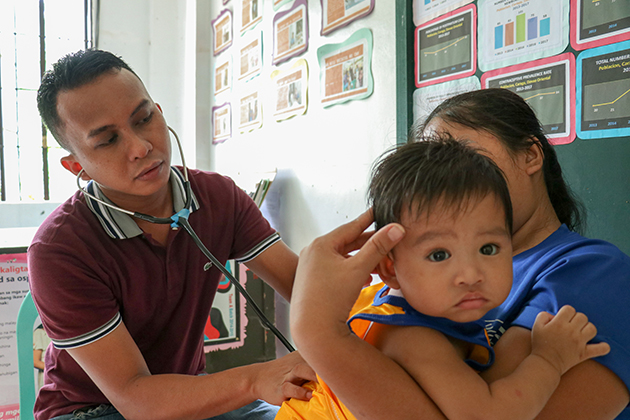Some may have the mind-set that health issues are only the responsibility of health officials and health workers. But this is not how the leaders think in the coastal municipality of Caraga in Davao Oriental. In Caraga, all sectors from the municipal government to the barangay (village) are involved in the health system and accountable in improving health indicators, especially on maternal and child health.
"We really have to do something about maternal and child care because there should be no mother or newborn dying from childbirth," says Alicia Mori, mayor of the municipality.

With the support of the World Health Organization (WHO), Department of Health (DOH) and the Korea International Cooperation Agency (KOICA), Caraga was able to introduce the Performance Accountability System (PAS) to track how the municipality is doing in terms of decreasing the deaths of mothers and newborn babies. The system monitors the factors which contribute to reduced maternal and neonatal deaths such as quality prenatal care, facility-based deliveries, and availability of skilled-birth attendants.
"In implementing PAS, we first have to do a breakthrough plan, which is dependent on the needs of the barangay," shares Dr Chris Limen, Caraga’s designated municipal health officer. Caraga has a total of 17 barangays which Dr Limen explains have their own specific health issues and needs. Through the PAS, the barangays were involved to plan, implement and monitor their health programmes from the beginning.
"It took time for the barangay officials to understand the importance of PAS in the delivery of health service and in improving their health indicators," explains Ramon Burgos, the DOH representative in Caraga. "Now that PAS is implemented in the barangays, all barangay officials are involved in the implementation of the health programme and they already assume ownership of the programme at the barangay level."

"With this system, we give the officials the accountability especially with regards to the health of the people," added Dr Limen.
Aside from involving barangay officials in the programme, Caraga also introduced policies for health. Caraga issued an executive order to support the maternal and child health programme. The order mandates the barangay local government to include the Performance Accountability System into their governance systems as well as to establish the local health board composed of representatives from various sectors in the barangay.
"The institutionalizing of the PAS in the local government unit will ensure the sustainability of the programme in the municipality. In fact, Caraga is the first municipality legitimizing PAS through an executive order," shares mayor Mori.
The barangays, in turn, have also issued local ordinances to sustain their maternal and child health programmes.
The multi-stakeholder approach and concrete policy actions have paid off. The municipality has seen a drop in its maternal deaths since the programme was introduced. Before PAS was introduced in Caraga, the municipality recorded an annual rate of five maternal deaths every year from 2010 to 2014.
"Ever since PAS was implemented, the number of maternal deaths has decreased from one in 2015 to zero in 2016 to present," says Dr Limen.

With the successful outcome of keeping track through PAS, the future plan is to expand it to other areas in the Philippines with the support of the Department of Health.
"I think PAS is one of the best strategies in reaching health indicators like the maternal and child health indicators," explains Burgos, the DOH representative. “I would suggest that we not only implement the PAS in our cluster, but in other areas where there is high maternal and neonatal death."
The local officials of Caraga worked together to introduce better governance and accountability in health and this clearly resulted in improving health service delivery, and consequently, reduced deaths of mothers and newborn babies. As Dr Limen says: "PAS has saved lives, especially the lives of our mothers and newborn children here in Caraga."
